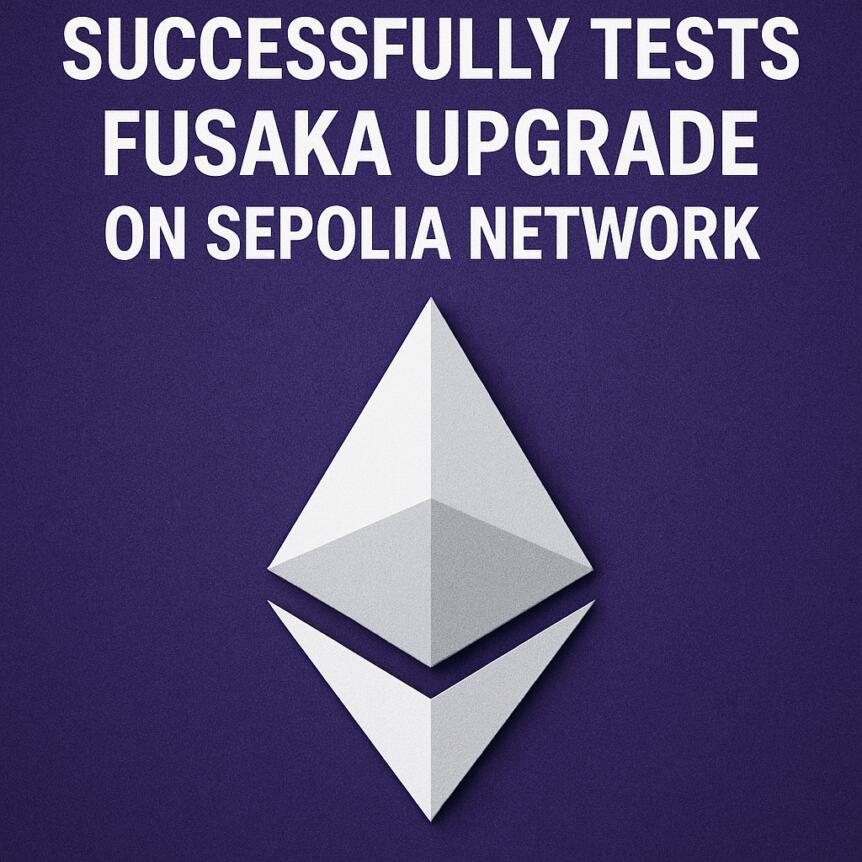Ethereum Successfully Tests Fusaka Upgrade on Sepolia Network

Ethereum continues its robust development trajectory with the activation of the Fusaka upgrade on the Sepolia testnet, marking a critical step toward enhancing blockchain scalability and efficiency. As the network prepares for its next major upgrade, industry stakeholders are closely watching how these updates will impact the performance of the world’s leading cryptocurrency and the broader DeFi ecosystem.
- The Ethereum Fusaka upgrade has been successfully launched on the Sepolia testnet, focusing on stress-testing new scalability features.
- The upgrade aims to increase the block gas limit to 60 million, allowing for more transactions and complex smart contracts.
- Key features include the testing of Peer Data Availability Sampling (PeerDAS), which reduces node data storage requirements.
- The upgrade is part of a broader Ethereum roadmap, with final testing scheduled for the Hoodi testnet in late October and mainnet launch in December.
- This development follows previous upgrades like Dencun and The Merge, charting Ethereum’s trajectory toward an energy-efficient and scalable blockchain.
Ethereum’s Fusaka Upgrade Moves Forward on Sepolia Testnet
Ethereum’s ongoing effort to improve network scalability has taken a significant step with the activation of the Fusaka upgrade on the Sepolia testnet. This phase, part of a three-step rollout detailed in the Ethereum Fusaka roadmap, follows the activation of the Holesky testnet earlier this month. The focus now shifts to testing new data-availability protocols and higher block gas limits, laying the groundwork for the network’s next major upgrade.
The full aim of Fusaka is to push the Ethereum block gas limit to 60 million, enabling the network to process a larger volume of transactions and support more complex smart contracts, which is essential for DeFi and NFT applications. Developers are testing whether nodes can sustain higher capacity without compromising network stability, a critical factor for future scalability.
In tandem with larger blocks, developers are also testing Peer Data Availability Sampling (PeerDAS). This innovative method allows validators to verify transaction data by sampling small chunks from multiple peers, thereby reducing the amount of data storage required at each node. Paul Harris, a protocol engineer at Consensys’ Teku client, emphasized that PeerDAS represents a major evolution in Ethereum’s data handling, enabling greater scalability while preserving decentralization.
“Fusaka changes how data availability is done, enabling scaling beyond what was previously possible with PeerDAS,” Harris explained.
Ethereum Foundation announced the Fusaka testnet schedule, with the final test on the Hoodi network slated for October 28 and an anticipated mainnet deployment in December. These timelines signal the network’s commitment to systematic upgrades that bolster performance without sacrificing security or decentralization.
A Brief History of Ethereum Upgrades
Since launching in July 2015, Ethereum has undergone numerous upgrades aimed at addressing scalability, security, and usability. The recent Pectra upgrade in May introduced functionalities like smart contract interoperability with external accounts and increased validator staking caps. Prior to that, the Dencun upgrade in March significantly reduced gas fees, lowering costs by up to 95%, which has fueled broader adoption and activity on the blockchain.
Ethereum Hard Fork timeline. Source: ethroadmap.comThe landmark Merge in September 2022 was a pivotal upgrade that transitioned Ethereum from a proof-of-work to a proof-of-stake consensus mechanism, drastically reducing energy consumption by up to 99%. This shift not only improved the network’s environmental footprint but also laid the foundation for further scalability solutions.
In April 2023, the Shanghai upgrade allowed validators to withdraw staked Ether for the first time, completing Ethereum’s move to a fully proof-of-stake network. These milestones illustrate Ethereum’s ongoing efforts to refine the blockchain infrastructure, making it more sustainable and capable of handling the increasing demands of the crypto markets.
This article was originally published as Ethereum Successfully Tests Fusaka Upgrade on Sepolia Network on Crypto Breaking News – your trusted source for crypto news, Bitcoin news, and blockchain updates.
También te puede interesar

VanEck submits updated Solana staking ETF application to the US SEC, with a fee of 0.30%

Health Insurers To Cover Covid Vaccines Despite RFK, Jr. Moves
